Estates-General
This content was compiled/created by Siobhán Kelly and Caoimhe Mahon.
Even though France was an absolute monarchy where the king had power over everything and did not consult with elected politicians, it did have a parliament called the Estates-General. 1789 was the first meeting since 1614 of this general assembly that represented the three French estates of the realm: the Church (First Estate) the nobility (Second Estate) and the common people (Third Estate). The Estates General only met under the direct order of the King. Because of this the meetings were seldom held. The Estates General was later undermined and eventually replaced by the revolutionary National Assembly.
____________________________________________________________________________________________________________
Make up of the Estates General
[youtube]http://www.youtube.com/watch?v=e97ZqZSUZEs[/youtube]
____________________________________________________________________________________________________________
Louis XVI called the Estates-General together in May 1789 because the country was bankrupt and he wanted to raise taxes. This meant that an already strapped Third estate would have had to did even deeper into their pockets to bail out the country while the First and Second Estate would continue to escape without paying any taxes. Because the voting system was rigged (each estate could only got one vote meaning that the Third Estate were always outvoted), there was huge anger from the representatives of the Third Estate. Eventually they broke away to form their http://teachnet.eu/tobrien/wp-admin/page.php?action=edit&post=315&message=1own meeting at the National Assembly
_____________________________________________________________________________________________________________
From Estates-General to National Assembly
[youtube]http://www.youtube.com/watch?v=Akv4EIquv-0&NR=1[/youtube]
____________________________________________________________________________________________________________
Part One – Not Happy (Background to Revolution)
By 1788 the French were a bit unhappy. Ok, they were very angry. The economy was in the dumper, the monarchy was broke and squeezing money out of the populace (but not the nobility or the clergy), and there were a series of poor harvests. The people were broke, hungry and grumpy.
Louis XVI was king and he was another of those useless kings who far outnumber the genuinely good ones in history. He was a very mean, unfair man. He also had a bunch of ministers who pretty much couldn’t agree on what colour grass was, never mind important decisions of state.
In September 1788 Louis got fed up and summoned Parliament. This was a law court where they passed opinions on the laws of the land but a) couldn’t permanently prevent anything the monarch really wanted, because b) they could be exiled, dismissed, recalled and generally abused by the monarch. Not a hugely useful state of affairs. Also they weren’t elected like British Parliament
But by September 1788 they were in a powerful position because Louis was desperate. The people didn’t like paying taxes whilst the nobility didn’t pay. The Parliament’s solution was to ask for an Estates General. This was a meeting of the three estates, the clergy (first estate), the nobility (second estate), and everyone else (third estate). There hadn’t been one since 1614. Clearly forward looking solutions weren’t fashionable that month.
This wasn’t very popular with the people because they thought this meant that the first and second estates (i.e. not the people) would dominate the Estates General. They got angry at Parliament. The people of France got angry a lot in those days. Not like today when they never have massive riots or block entire ports with their lorries.
Anyway, these bolshy ( radicals or revolutionaries) people were also publishing a lot of pamphlets and forming clubs to discuss politics, and generally did things which the king didn’t like. This was known as thinking for yourself and is not popular with monarchs, especially slightly depressed ones.
The king agreed to the Estates General. Then Parliament changed its mind and decided it didn’t want one after all but it was too late as the invitations had been sent out, and the king had ordered in the party hats and it would annoy the people who were very bolshy.
Part Two – The Estates General
One problem with the Estates General is illustrated below.
The Third Estate had as many members as the other two Estates put together but each Estate had one vote. So they weren’t really represented. However the people were, as we have seen, a bit bolshie and Louis was worried, so he changed the rules so that there was per head voting, meaning that the Third Estate had as many votes as the other two put together. This may have been down to the troublesome Parisians or maybe it was the fault of Louis XVI’s useless ministers.
The Third Estate was worried about government corruption, and privilege being misused. The people were inspired by this and sent in loads of cahiers, very polite messages to the king to please out their problems, please.
The Third Estate was also letting people come into its sessions and view its working unlike the other two Estates. All of this seems very populist, but it’s worth remembering that there were no peasants or workers in the Estates General. Smelly peasants might get mud on the bourgeoisie’s clothes and we can’t have that now can we?
But there was trouble brewing. The Third Estate was getting ticked off at the lack of progress. So they decided to do something. On 17th June 1789 they declared themselves to be the National Assembly and went it alone with those members of the clergy and nobility who agreed with them.
On 2nd June 1789 the National Assembly went along to the chambers as usual only to find them locked by order of Louis XVI! Some people would have sent for the janitor to get it open or taken this as a sign of a day off and then gone shopping. But the National Assembly decided that it meant that Louis XVI was angry and planning to dismiss them or worse. They fled to the nearby tennis courts where they swore an oath not to disperse until there was a new constitution. To help future historians remember all this it was called the Tennis Court Oath.
Ironically it turned out that Louis XVI wasn’t plotting an attack on the National Assembly, he was just fed up with all the rowing and wanted a day or two of peace and quiet to collect his thoughts, before he addressed the National Assembly in person…
Part Three – Chaos in Paris
On 23rd June 1789, Louis XVI addressed his, by now very bolshie, National Assembly. There was widespread unrest across France and large-scale defections from the First and Second Estates to the National Assembly. Louis XVI offered some reforms, but there was to be very little social change. This wasn’t really what the National Assembly wanted to hear. Even when Louis XVI ordered all the remaining clergy and nobles to join the National Assembly there was unease.
For some people at the time this appeared to be a revolution completed. The monarch had been forced to concede and that was as far as revolutions usually went in those days.
Louis XVI then ruined it by sacking his moderate ministers and appointing new ones who were seen as counter-revolutionary. It really didn’t help that he then ordered the army to move into Paris. Naturally the Parisians responded by panicking and rioting.
A city council was formed and the bourgeoisie joined a new, revolutionary armed forces. In an attempt to get weapons they stormed the notorious prison, the Bastille. This is a hugely symbolic event in French history, possibly only ruined a little by the fact that there were only seven prisoners in there at the time.
But it was cool enough to get the rest of France to have a few riots and frivolities of its own. This included the towns and the cities as well as the peasants who had practise in revolting before. It was united by a feeling of jealousy; basically they didn’t like the nobles getting all the good stuff in life like no taxes and everyone else getting crapped on from a great height. The National Assembly also called for an end to all this, possibly because they believed it (some did) and possibly because they wanted to gain control of the rioters and stop the rioting.
By the 28th August 1789 had come the Declaration of the Rights of Man, which is seen as the end of the Bourbon monarchy’s absolute rule. Not that this was the end of the French Revolution. Hell, it was only the start; there was lots of fun to be had with wars, executions, terror and other things which make history quite depressing.
(To see this summary of The French Revolution in full, go to: Holly Cruise’s Blog.)
______________________________________________________________________________________________________________
[youtube]http://www.youtube.com/watch?v=psRZ6B9jj6k&feature=related[/youtube]
_______________________________________________________________________________________________________________
A (fictional!) diary entry for a priest in the first estate-
Dear Diary,
Today was very good because King Louis is going to rise the taxes for the Third Estate which means the standard of living will increase for the First & Second Estate. I was worried when I heard their was going to be a vote but I know with the voting system of one vote per Estate I will be happy because it will always be two against one!
I am a Priest so I hope that our tax ‘tithe’ will continue to be paid to us because that would continue to mean lots of money for us in the First Estate!
Yours,
Fr. Pierre
A (fictional) diary entry for a peasant in the third estate-
Dear Diary,
I am so angry with the unfair treatment that us in the third estate are receiving, I do more work in a day that any man in the first and second estate have done in their life! I have a family to feed but I have no money! King Louis makes new taxes the whole time and I am absolutely furious now because they wanted to increase the taxes even further. The problem is that it’s always going to be two against one because the first and second estate don’t have to pay the taxes, they just spend them!
Yours in anger,
Tom
For more information on The Estates General:
____________________________________________________________________________________________________________-
History@Banagher College, Coláiste na Sionna.
____________________________________________________________________________________________________________
The URI to TrackBack this entry is: http://teachnet.eu/tobrien/about/revolutions/the-french-revolution/estates-general/trackback/
3 Comments Leave a comment.
Leave a Comment
You must be logged in to post a comment.
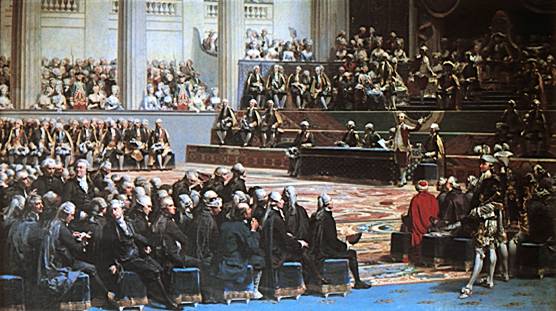
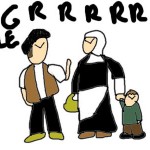
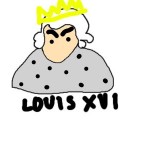
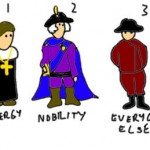
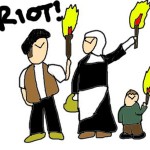
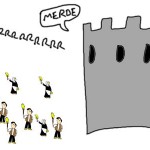
very good pictures and video’s.
this is a very good blog it is very easy to unterstand and i know more about the estates general now.
this was a very helpful blog for me when i was studying for my summer tests.